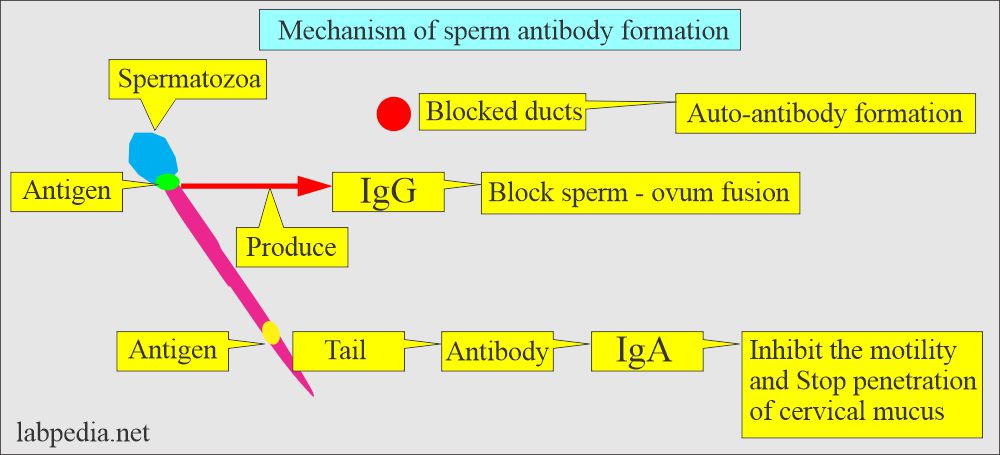Semen:- part 3 – Anti-Sperm-antibody
Anti-Sperm-antibody
What sample is needed for anti-Sperm-antibody?
- It can take male and female venous blood to make the serum.
- Take the blood of the male and female for serum preparation.
- Collect cervical mucus from the female.
What are the Indications for Anti Sperm-antibody?
- This is a screening test for an infertile couple.
- This detects antibodies against spermatozoa.
What is the pathophysiology of anti-sperm-antibody?
- These antibodies are found in patients with no evidence of endocrine, semen, or other abnormality.
- In such cases, measure the sperm-antibody titer.
- Sperm antibodies are directed against the sperm antigen.
- Antisperm antibodies are found in:
- Men with the blocked efferent duct.
- Men with a vasectomy show a 30% to 70% antibody.
- After vasectomy, these antibodies are common and seen in 50% of the cases (30% to 70%).
- The role of sperm anybody is controversial.
- Positive sperm antibodies are unimportant; we need the titer of the antibodies.
- The higher titer of the serum sperm-anybody is considered more positive evidence of infertility.
- Low titers are insignificant.
- Mildly raised titers are not considered hopeless.
- Higher titers are significant for infertility.
- The presence of sperm antibodies in females, which may be found in 7% to 17% of cases, is insignificant because some of these females become pregnant.
- Sperm antibodies found in the cervical mucus are more significant than detected in the serum.
What is the mechanism of antibody formation?
- Sperm from the blocked ducts leads to autoantibody formation as the immune system recognizes these as foreign substances.
- These antibodies are agglutinin or cytotoxic.
- The antisperm antibody of IgA type is against the sperm tail, inhibiting motility and decreasing cervical mucus penetration.
- Sperm antibody of IgG type blocks sperm-ovum fusion.
- A high titer of sperm antibodies is strong evidence of infertility.
- Sperm antibodies are found in 20% of females. Their significance in females is unclear because some of these ladies may become pregnant.
- In some studies :
- Women with primary infertility are 75% positive for sperm agglutinin antibodies.
- 11% to 15% of pregnant ladies show the same level of sperm antibodies.
What is the normal sperm antibody?
- Negative.
What are the causes of Anti-sperm antibodies?
- Blockage of testicular efferent ducts.
- After the vasectomy, almost every male has an antisperm antibody. After the reversal of the vasectomy antisperm antibody disappears.
- Infertility. This may be seen in both males and females.
How will you handle the sperm antibody?
To treat antisperm antibodies, the possibilities are:
- Use of the condom.
- Sperms are processed to remove the antibodies.
- Immunosuppressive therapy can be given both in males and females.
- Invitro fertilization (IVF) can be tried.
Questions and answers:
Question 1: What type of antibody forms against the tail of sperm?
Question 2: How to get rid of anti-sperm antibody?

